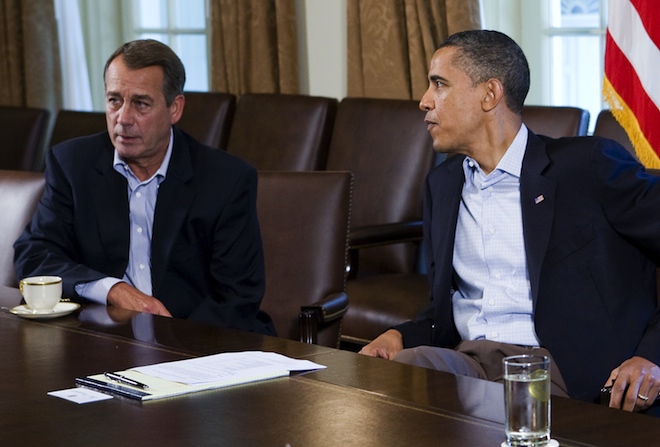For at least the next several weeks, politics will undergo a strange transposition, during which Republicans will warn of the economic dangers of cutting government spending, and President Obama will barnstorm the country warning voters that Republicans are inviting a tax increase on the majority of Americans.
The timelines won’t align perfectly, and the Democrats will have a greater sense of urgency. But in the wake of Super Committee failure, Democrats and Republicans are staring down uncomfortable deadlines, and each party’s best bet for avoiding outcomes that harm their interests is to adopt the other’s rhetoric.
At the end of the year, a payroll tax holiday that many economists credit with buoying the U.S. economy in 2011 is scheduled to expire. The effect will be a noticeable tax increase with low and middle class workers — the very demographic that needs to be spending more, not less, if the economy is going to recover. Obama wants to renew it — in fact he wants to deepen it. But Republicans have little incentive to help Democrats keep the economy afloat or to help it grow. And Republicans will at least demand that the costs be offset — something they’ve almost never done with previous tax cuts. So for the next six weeks, Obama and Congressional Dems will squeeze Republicans. They won’t demand that the cut be offset, but they’ll propose offsetting it by raising taxes on wealthy Americans.
“Are we going to cut taxes for the middle class, working folks, $1500, paid for by a small haircut for the wealthiest Americans. Pretty clarifying statement,” said one Senior Administration Official at a White House background briefing for reporters on Monday. “This is a moving, moving issue.”
The rhetoric is artificially similar to rhetoric Republicans have used (and continue to use) to fight the expiration of any of the Bush tax cuts. The policies are, of course, very different. And the Bush tax cuts aren’t set to expire again for another year when, hopefully, the economic recovery will have a bit more momentum. But if Democrats aren’t careful with their words, Republicans will keep them filed away for next year’s bigger fight over raising taxes.
The reverse is also true. Republicans will fight deep, automatic cuts to defense and security programs, scheduled to take effect January 2013 as a result of the Super Committee’s inaction. Indeed, they’ve been at it for weeks. Their fight centers on — what else! — the human toll and the harm spending cuts will do to the economy.
Briefly before the Super Committee officially failed, House Armed Services Committee chairman Buck McKeon said he’d lead the charge to nix that half of the sequester.
“I will be introducing legislation in the coming days to prevent cuts that will do catastrophic damage to our men and women in uniform and our national security,” McKeon said. “Our military has already contributed nearly half a trillion to deficit reduction. Those who have given us so much, have nothing more to give…. I will not be the armed services chairman who presides over crippling our military. I will not let these sequestration cuts stand.”
The irony is that both parties have a strong economic case to make. And in that sense this mutual about face illustrates neatly why everyone should take the usual Capitol rhetoric with a grain of salt.










